An Oil Pipeline is Threatening the Great Lakes
The Line 5 pipeline has already leaked over 1 million gallons of oil to date and threatens the Great Lakes. Time is running out to stop one company’s dangerous plans to keep the oil flowing.
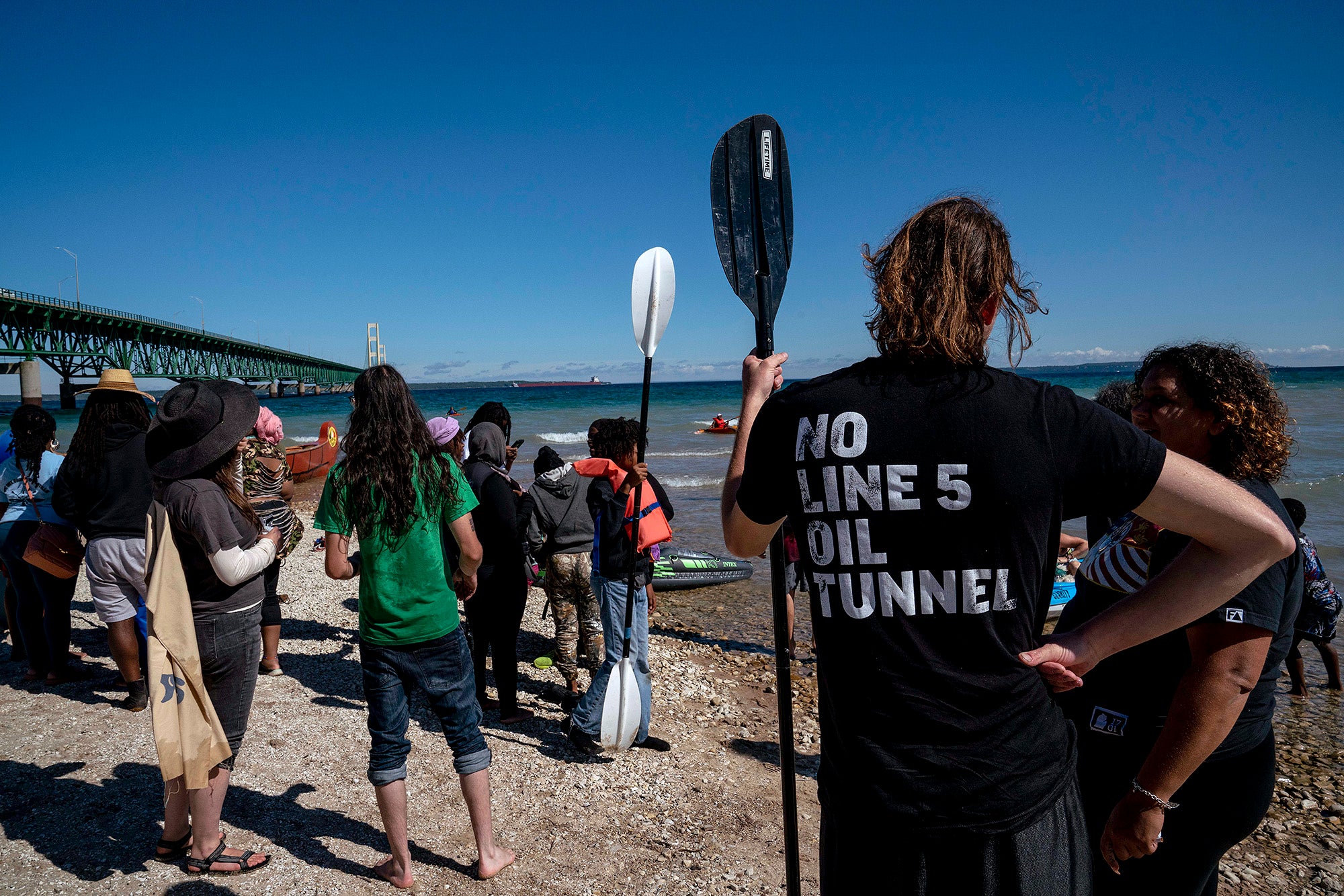
A battle is raging over the largest surface freshwater system in the world.
The Great Lakes are a defining cultural and ecological anchor for the Midwest. The lakes hold one-fifth of the world’s supply of surface freshwater, supplying drinking water to up to 40 million people in the U.S. and Canada. The iconic system of five lakes spans more than 95,000 miles, creating one of the most diverse watersheds in the world that is home to 3,500 species of plants and wildlife and more than 250 species of fish.
But the Line 5 pipeline puts it all at risk.
What is the Line 5 pipeline?
Despite the lakes’ immense significance, the Canadian oil giant Enbridge is shuttling toxic fossil fuels through an old pipeline that has run through the middle of the Great Lakes since the 1950s. The Line 5 pipeline transports up to 23 million gallons of crude oil and gas each day through Wisconsin and Michigan to Canada. It runs through hundreds of interconnected waters including through the tribal reservation of the Bad River Band of Lake Superior Chippewa in Wisconsin and the treaty-protected areas for Bay Mills Indian Community in Michigan. None of the Tribes were consulted during Line 5’s construction, yet they have lived with its catastrophic risk for decades.
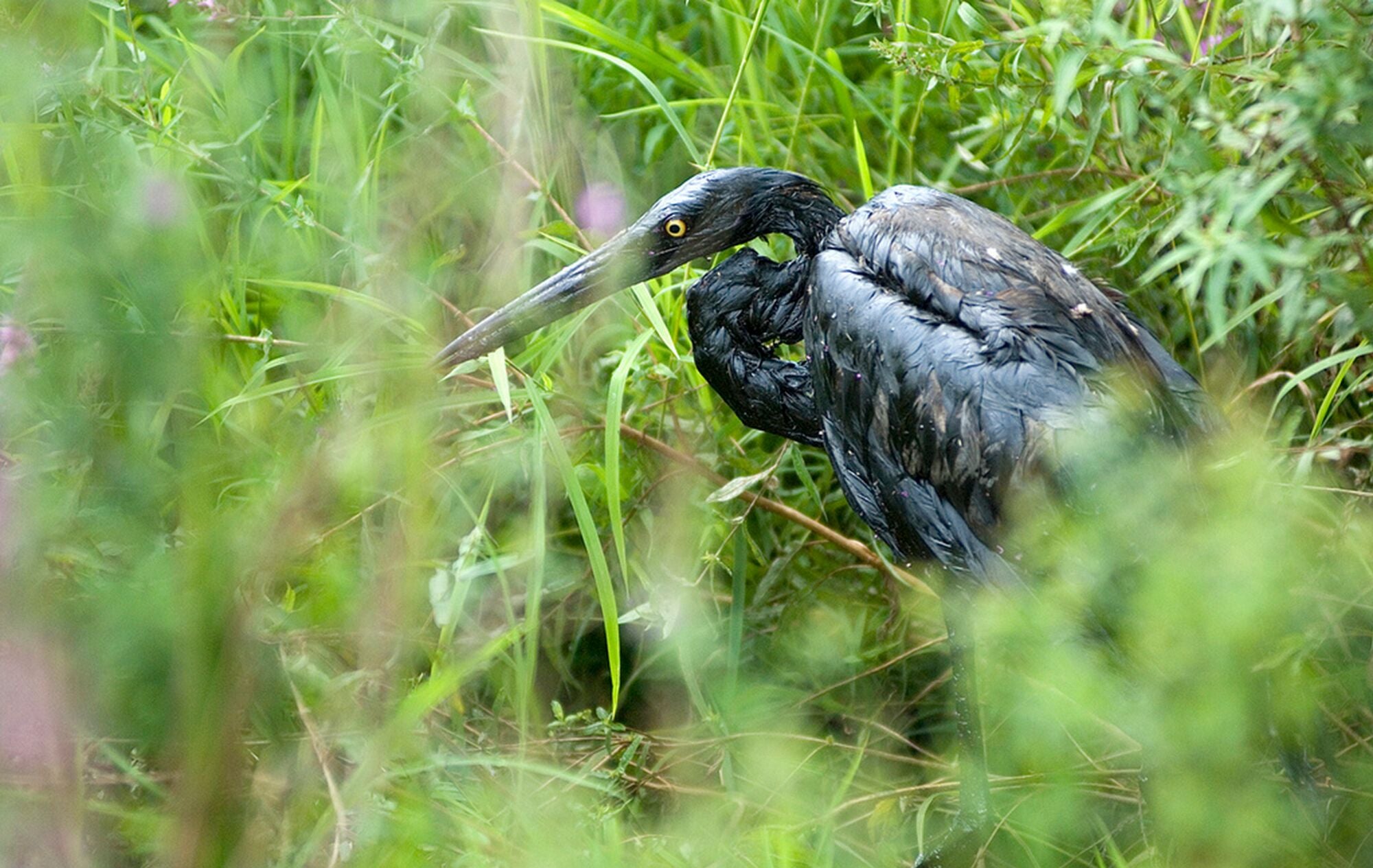
An oil covered bird sits on the side of the Kalamazoo River after an oil spill of approximately 800,000 gallons of crude from the Line 5 pipeline near Marshall, Michigan in 2010. (Michigan Department of Environmental Quality.)
The Bay Mills Indian Community and other Tribal Nations have been fighting in court to stop Enbridge from building a massive, risky underground tunnel to house a replacement section for the dual pipelines that currently run in open water through the Straits of Mackinac. Despite evidence of a serious risk of an explosion and oil spill, the Michigan Court of Appeals upheld approval for Enbridge’s tunnel project. The Tribal Nations and allies have taken this fight to the Michigan Supreme Court.
Separately, the Michigan Department of Environment, Great Lakes, and Energy is poised to grant Enbridge the final state permit it needs. If Enbridge succeeds in building the tunnel project, it will extend the life of Line 5, risking the Great Lakes and increasing greenhouse gas emissions for another century. People across the country are speaking up against the project to preserve the Great Lakes for future generations.
Unacceptable risks loom
Line 5 has a terrible environmental track record. The pipeline has leaked over 1.1 million gallons of oil over its lifespan, polluting important watersheds and surrounding communities. Today, it is operating 20 years past its engineered lifespan, risking malfunction due to corrosion and pressure. Line 5 is also a huge contributor to planet-warming emissions, spewing about 87 million metric tons of carbon dioxide equivalent annually — the equivalent of 19 million gas-powered cars.
Line 5 poses an unacceptable risk of an oil spill in some of the earth’s most sensitive and treasured ecosystems. That includes the Straits of Mackinac, where dual Line 5 pipelines cross under waterways that connect Lakes Huron and Michigan. The straits are the site of creation for the Anishinaabe people, who have hunted, fished, and gathered medicinal plants there since time immemorial and continue to do so today.
Line 5 also threatens the Kakagon-Bad River Sloughs, a wetland of international importance in northern Wisconsin that harbors the region’s largest bed of wild rice, a cultural staple for Anishinaabe people. The Bad River Band is fighting to remove the Line 5 oil pipeline from their homeland along Lake Superior. A federal judge ruled that Enbridge has been illegally trespassing for over a decade and must be shut down by 2026. Enbridge now wants to re-route the pipeline to get around the Bad’s reservation, keeping the oil and profits flowing while prolonging the threat to the Band’s home, Lake Superior, and all the Great Lakes.
The threat of Line 5 has already caused a near emergency. In Wisconsin, rapid riverbank erosion in the spring of 2023 brought the Bad River current within 11 feet of the pipeline, prompting the Band River Band to ask a judge for an emergency shutdown to prevent an oil spill. The Band has warned for years that the naturally widening river could eventually come dangerously close to the pipeline. In June 2023, a federal court ordered Enbridge to shut down the section of the pipeline that trespasses on the Band’s sovereign lands within three years. Both sides are now challenging that decision before the 7th Circuit Court of Appeals.
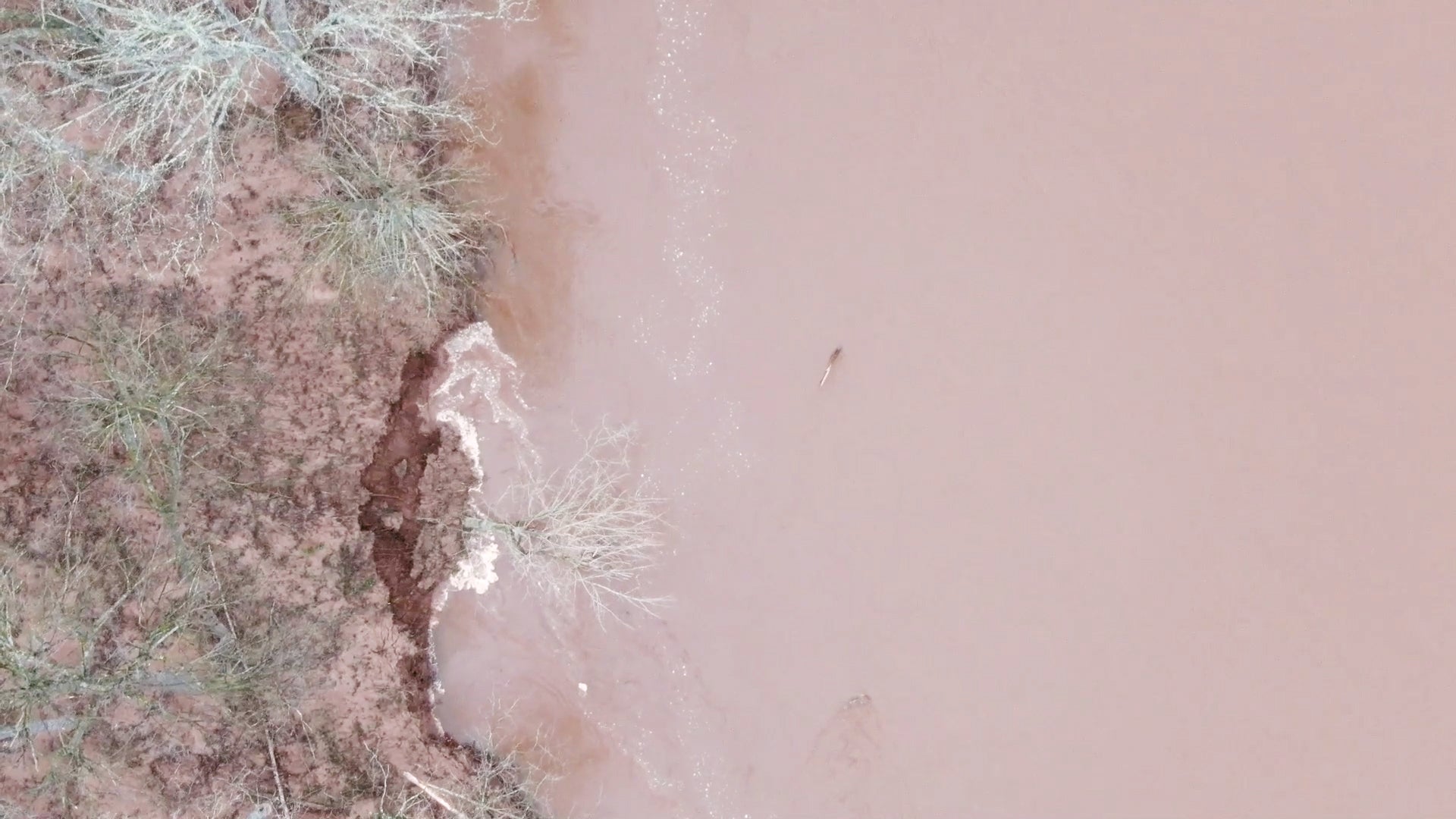
A tree falls into the Bad River in Wisconsin on June 1, 2023. Rapid erosion had left the Line 5 oil pipeline just a few yards from being exposed to the powerful current of Wisconsin’s Bad River. (Bad River Band of Lake Superior Chippewa)
Enbridge’s proposals are no solution
Enbridge is now hoping to keep Line 5 on life support by proposing two ill-conceived projects.
One proposal is the oil tunnel project underneath the Straits of Mackinac. Multiple safety experts have warned that the tunnel project design is flawed and untested, and that it could cause a massive explosion and an oil spill in the heart of the Great Lakes. The tunnel project construction also threatens to harm an area that is replete with cultural, economic, and spiritual significance for Bay Mills and other Tribal Nations.
Enbridge’s second proposal is a new 41-mile section of pipeline that would reroute Line 5 around the Bad River Band’s Reservation. This new pipeline would cross nearly 200 sensitive watersheds upstream from the Reservation, threatening the Band’s home and drinking water. In 2024, the Wisconsin Department of Natural Resources approved state permits for the project. The Bad River Band, represented by Earthjustice, is challenging these permits in court. The reroute already has federal approval from the U.S. Army Corps of Engineers, which in August 2024 received more than 150,000 comments from project opponents, including health professionals, faith groups, and regional businesses.
As the erosion in 2023 showed, building a pipeline through the region around the Bad River is a disaster waiting to happen. The watershed around the Bad River Band’s Reservation feeds into Lake Superior, so any pollution from the pipeline would flow downstream to the Great Lakes and through the Kakagon-Bad River Sloughs. There is also a risk that pollution from the pipeline’s construction would contaminate groundwater, which would impact the Band’s drinking water.
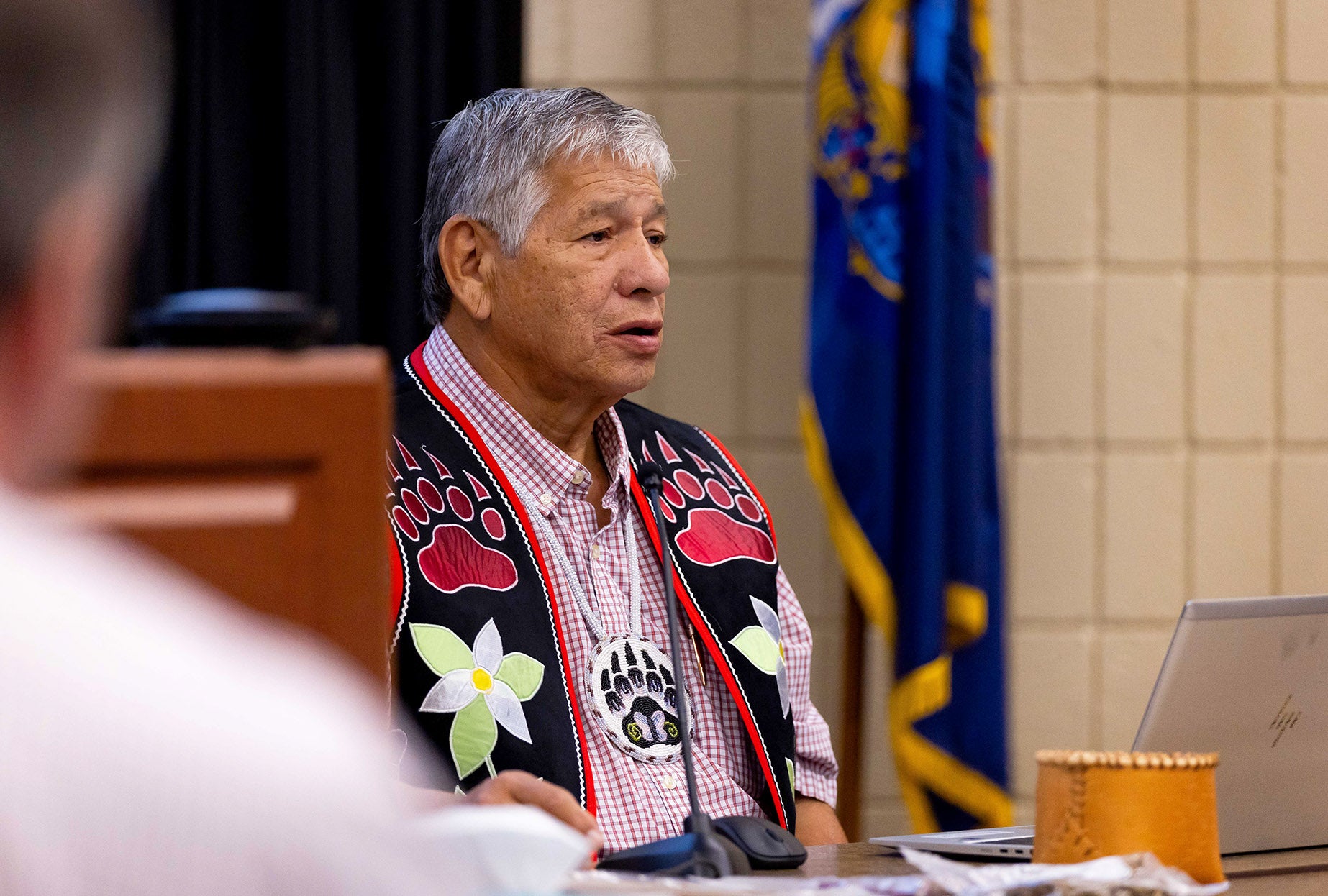
Former Bad River Band Chairman Robert Blanchard answers questions from Earthjustice Senior Attorney Stefanie Tsosie on September 15, 2025 at Northwood Technical College in Ashland, Wisconsin during hearings related to Line 5 permitting. (Derek Montgomery for Earthjustice)
Both proposals threaten the Great Lakes and tribal lands — and our climate. Extending Line 5’s operation needlessly extends our use of, and reliance upon, fossil fuels, which would exacerbate the effects of climate change at a time when the United States must transition to clean energy.
Fighting for our Great Lakes
Both of Enbridge’s proposals — a tunnel under the Straits and a new pipeline around the Bad River Band’s reservation — have drawn local, national, and international opposition. Earthjustice is challenging both proposals.
- The reroute: Earthjustice is representing the Bad River Band in challenging Wisconsin’s permit through an administrative appeal and a lawsuit. We also represent the Band in opposing federal permits for the Line 5 reroute.
- The tunnel: Alongside the Native American Rights Fund (NARF), we represent the Bay Mills Indian Community in challenging the Michigan Public Service Commission’s permit before the Michigan Supreme Court, the Department of Environment, Great Lakes, and Energy’s previous permit, and in opposing remaining state and federal permits for the project.
We are also working to remove and shut down the current pipeline. In 2023, Earthjustice represented a coalition of 63 Tribal Nations from across the Midwest and Canada in an amicus brief supporting Michigan’s Attorney General in a lawsuit to remove the Line 5 pipeline from the heart of the Great Lakes.
In June 2025, the U.S. Supreme Court agreed to hear Enbridge’s attempt to remove the case to federal court. Ten Tribal Nations represented by Earthjustice filed an amicus brief urging the Supreme Court to reject Enbridge’s arguments.
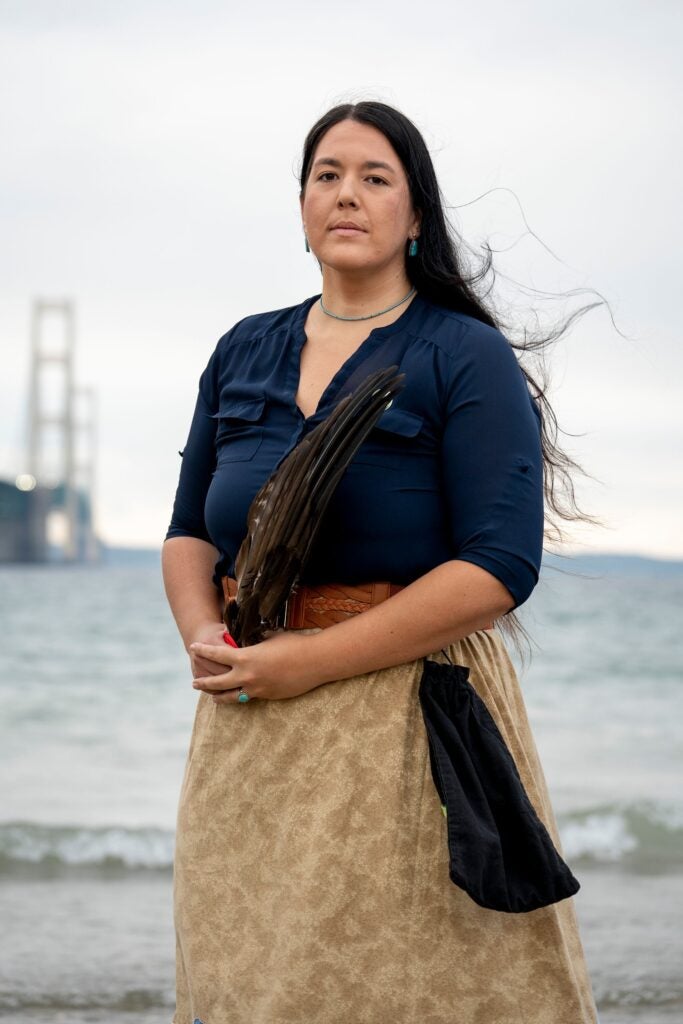
Whitney Gravelle, the president of the Bay Mills Indian Community. (Sarah Rice for Earthjustice)
Originally published on October 12, 2023.
We fight to ensure our tribal and Indigenous clients’ natural and cultural resources are protected for future generations.